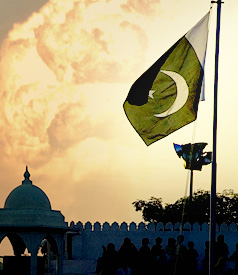Support justice-driven, accurate and transparent news — make a quick donation to Truthout today!
Lahore, Pakistan – The death toll from a massive suicide attack at a volleyball tournament in northwest Pakistan mounted to 95 on Saturday, in what appears to be another retaliatory strike for recent Army offensives against the Taliban.
More than 600 civilians have now lost their lives to such attacks since the Pakistan Army began a military offensive in the Taliban stronghold of South Waziristan in October. Friday night’s attack was the second deadliest of these, after a market bombing in Peshawar in October that killed 130.
According to police, the main target of the New Year’s Day attack in the town of Lakki Marwat was probably a local anti-Taliban militia, as militants seek to underscore their ongoing potency and counter government claims that they are on the defensive.
But despite the setback, local opposition to the Taliban is likely to remain firm, according to Abdul Basit, a security analyst at the Islamabad based Pakistani Institute for Peace Studies.
“The dynamics currently are that people have understood the fact that Taliban militants have broken the social ethos of Pashtun society,” he says, adding, “I don’t believe it will dampen their resolve.”
Militias Had Received Threats
Lakki Marwat borders North Waziristan and is home to a number anti-Taliban militias, known as lashkars, which had been receiving threats in the runup to Friday’s attack.
“We have been receiving threats from militant groups in the North Waziristan,” Mushtaq Marwat told Dawn newspaper.
District police chief Mohammad Ayub said that spectators had gathered on a field on Friday evening to watch two local teams play when an explosive-laden pickup rammed into a nearby wall. Several houses and a portion of a nearby mosque where a militia meeting was in progress were also destroyed in the blast, according to Gul Janan, a member of the committee.
On Saturday, rescue workers continued to pull up bodies from the rubble as the full extent of the carnage was uncovered.
Successes in Swat May Bolster Local Resolve
Anti-Taliban militias have met with some success over the past few months in the former Taliban stronghold of the Swat, as the “Army has attempted to use them as proxies in areas where it cannot maintain a permanent presence,” according to Mr. Basit, the analyst.
Whereas in previous years, the Taliban were able to quickly demoralize and dismantle the militias by killing their leadership, the success in Swat means it’s unlikely Friday’s attack will end local resistance, he says.
“Whether they make these lashkars or not, they are facing the music, so for most people it’s better to resist than to sit back and see your loved ones killed,” Basit says.
Rifaat Hussain, an analyst at Quaid-e-Azam University in Islamabad, adds that it may have been impossible for the Army to interdict the movement of fleeing militants, and neighboring tribal areas can expect to see an escalation in attacks unless the Army widens its offensives. The attack, he says, may give the Army the impetus it requires to make such a move.
Basit argues the attack is further evidence that the Army has inflated its claims of success in its South Waziristan offensive, and that key militants have been allowed to slip away into neighboring regions.
“The Army claims to have killed 600 militants and captured 1,000, but have yet to produce any evidence,” he says, adding that no key leaders have been killed or captured. “The military is playing hide and seek.”
Last Monday, a bombing at a Shiite religious procession in the southern city of Karachi left 43 dead, in an attack later claimed by the Taliban.
Clinton Condemns Attack
US Secretary of State Hillary Clinton, meanwhile, condemned Friday’s attack. “The Pakistani people have seen terrorists target schools, markets, mosques, and now a volleyball game,” she said in a statement, adding that the US would continue to stand by Pakistan in its efforts to “combat violent extremism and bolster democracy.”
A terrifying moment. We appeal for your support.
In the last weeks, we have witnessed an authoritarian assault on communities in Minnesota and across the nation.
The need for truthful, grassroots reporting is urgent at this cataclysmic historical moment. Yet, Trump-aligned billionaires and other allies have taken over many legacy media outlets — the culmination of a decades-long campaign to place control of the narrative into the hands of the political right.
We refuse to let Trump’s blatant propaganda machine go unchecked. Untethered to corporate ownership or advertisers, Truthout remains fearless in our reporting and our determination to use journalism as a tool for justice.
But we need your help just to fund our basic expenses. Over 80 percent of Truthout’s funding comes from small individual donations from our community of readers, and over a third of our total budget is supported by recurring monthly donors.
Truthout has launched a fundraiser, and we have a goal to add 280 new monthly donors in the next 72 hours. Whether you can make a small monthly donation or a larger one-time gift, Truthout only works with your support.
